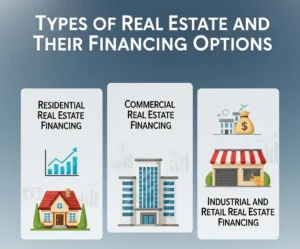Real Estate Finance: A Comprehensive Guide to Funding
If you have ever thought about buying a home, investing in commercial property, or developing land, you may have already asked yourself one question: How will I finance this? Real estate finance is the answer.
Understanding real estate finance will help you turn your property dreams into tangible assets, whether you’re buying your first apartment or funding a large commercial development.
Understanding Real Estate Finance
Real estate finance is essential to any successful real estate transaction. This section discusses the importance of real estate finance. This section also explains important concepts such as LTV, DSCR and capital stack.
Understanding the basics will help you to avoid costly mistakes, whether you’re a buyer or a developer.
What is Real Estate Finance?
The process of real estate financing involves securing money for transactions involving property. This includes loans, mortgages, and equity financing. Balance cash flow, return, and risk.
You can invest in your dream house, a commercial plaza or a residential community.
Importance of Real Estate Finance in Projects
Real estate projects require capital. Without strategic financing, even the most promising of projects can fail. Effective real estate finance:
- The project progress is monitored, and the liquidity of the project is ensured
- Spreading financial risk between lenders and investors
- Developers can scale operations
- Investors looking for long-term returns can now take advantage.
Financial planning is essential for every stage of the construction process, from land acquisition to marketing.
Key Concepts in Real Estate Financing
You should be able to grasp the following core concepts:
- LTV Ratio (Loan-to-Value): A measure of lender risk that compares the amount of the loan to the appraised property value.
- The Debt Service Coverage Rate (DSCR) is a measure of whether a property can generate enough income to pay off its debts.
- Amortisation is the process of repaying a debt over time through regular payments.
These concepts can help you assess the viability, sustainability, and profitability of any real estate venture.
Types of Real Estate and Their Financing Options
Financing strategies for different property types will differ. This section describes the different funding options available for various real estate segments, from home loans to commercial development. This section helps you select the best financial path for your project or investment goals.
Residential Real Estate Financing

These include homes, plazas, and apartments for personal use or rental. The following are common financing methods:
- Fixed- or floating-rate home loans
- Government-backed institutions offer housing finance schemes
- Builder subsidy plans for under-construction properties
Low interest rates, tax incentives, and flexible EMI options are often available to first-time homebuyers.
Commercial Real Estate Financing
Commercial properties such as office buildings, hotels, or malls require larger capital and structured financing models like
- Banks or NBFCs offer commercial property loans
- Private equity investment
- Joint venture funding for development projects
The ROI cycle for these projects is longer, but the rental income and asset appreciation are higher.
Industrial and Retail Real Estate Financing
Financing requirements for warehouses, factories and retail showrooms are unique. Before offering financing, lenders will consider factors such as tenant occupancy, location viability and lease agreements.
- Lease Rental Discounting (LRD).
- Industrial setup loans are on a term loan
- Retail chains can now get a loan backed by their inventory
The financing models for these properties are designed to suit their operational nature.
Mortgage Options for Real Estate Projects
The most common way to finance a property purchase is with a mortgage, but selecting the right one can be difficult. This section will explain the different types of mortgages, how to apply step-by-step, and what common mistakes you should avoid. This is a must-read guide for anyone looking to borrow money in the real estate market.
Types of Mortgages Available
Depending on your financial status and the project that you want to finance, there are different mortgage options available.
- Fixed-rate mortgages provide predictable interest rates, EMIs and repayment schedules
- The interest rates on adjustable-rate mortgages (ARMs), which are based on the market, fluctuate according to its rate.
- Balloon mortgages: low initial payments, high lump sum at the end
- Reverse mortgages are a way for seniors to borrow money against their equity.
Make your decision based on what you want to achieve in the long term.
Mortgage Application Process
You can apply for a mortgage in several ways:
- Pre-qualification: Estimate your loan eligibility
- The application must be accompanied by documents such as proofs of income, identification, and property papers.
- Lenders assess risk and conduct a credit check.
- Final approval is required for the disbursement and sanctioning of loan funds
You should ensure that your income statement, your credit score, and any property documents you have are in order.
Common Mortgage Mistakes to Avoid
- Fine print can conceal hidden fees
- Overborrowing without evaluating repayment ability
- Teaser rates may not be the best choice.
- Compare mortgage offers from different lenders
Doing your homework can help you save thousands in interest.
Real Estate Investment Strategies
Investing in real estate isn’t about just buying and waiting. This section explores strategies that are suitable for beginners, such as REITs. It also explains how to manage risk and evaluate investment opportunities. This is the perfect guide for anyone looking to build wealth through real estate.
Investing in REITs: A Beginner’s Guide
Real Estate Investment Trusts are an excellent way to invest without owning any physical assets. Like mutual funds, they pool money to invest in real estate that generates income.
Why Choose REITs
- Lower entry point
- Diversification
- Steady dividend income
- Liquidity is the amount of money that’s listed on stock exchanges.
REITs are a safe way for new investors to enter the world of real estate finance.
Evaluating Real Estate Investment Opportunities
Assess the property before investing.
- Location Potential
- Rental yield
- Capital Appreciation Trends
- Demand and supply in the market
Risk Assessment in Real Estate Investments
Each investment is fraught with risk: market slowdowns, regulatory obstacles, tenant defaults or cost overruns.
Reduce risk by:
- Diversifying Your Portfolio
- Avoiding over-leveraging
- Conducting due diligence
- Selecting reputable developers or asset managers
Real estate investment success is built on smart risk management.
Financial Models in Real Estate Development
A financial model brings your real estate vision to life on paper. This section will guide you through the process of building successful models, tracking key performance indicators, and learning from case studies. This is essential reading for investors and developers who are looking to achieve structured growth.
Creating a Successful Financial Model
Financial modelling can help developers predict returns, plan financing, and pitch investors.
A real estate financial model includes:
- Costs of construction projected
- Planned leasing or sales in phases
- Operating Income and Expense Schedules
- Cash flow statements, ROI timelines
Key Performance Indicators
To measure project performance, track:
- Gross Development Value
- Return on Investment (ROI).
- Payback Period
- DSCR and IRR
Case Studies in Real Estate Financial Modelling
- Pune residential township: A presales model and a phased development strategy reduced funding requirements.
- Commercial complex in Gurgaon – Equity and mezzanine financing supported rapid construction, while leasing provided early cash flow.
- Retail mall in Mumbai suburbs – REIT exit was planned from the start; financial model aligned to long-term asset goals.
Final Thoughts
Real estate finance involves more than just borrowing money. It’s also about structuring deals and managing risks, maximising returns, as well as building sustainable assets. Understanding the basics of real estate financing can help you make better property decisions, whether you are a first-time home buyer, an investor or a developer.


Write Your Comment